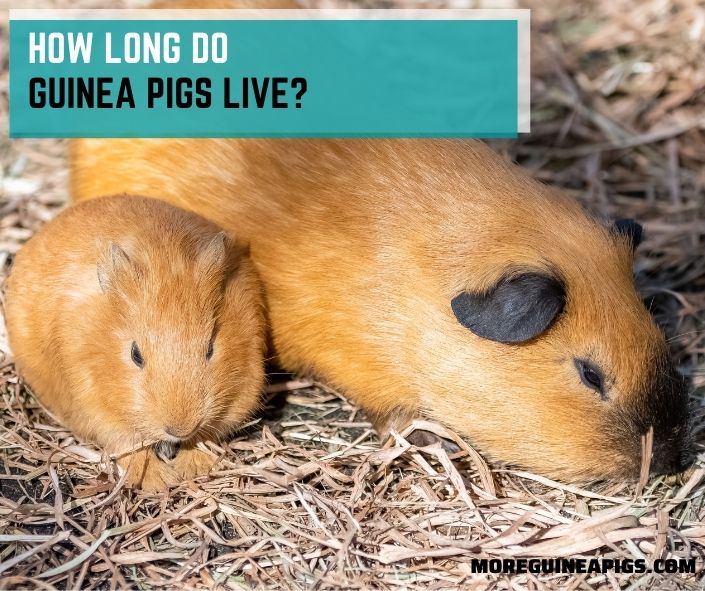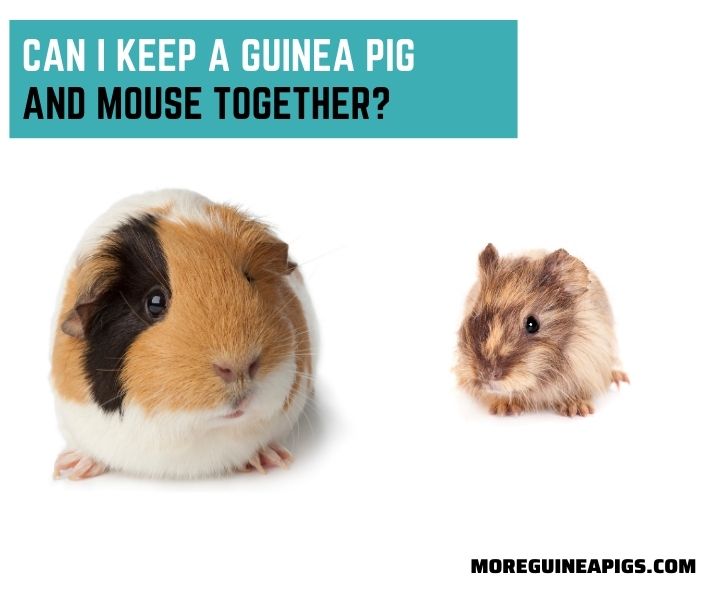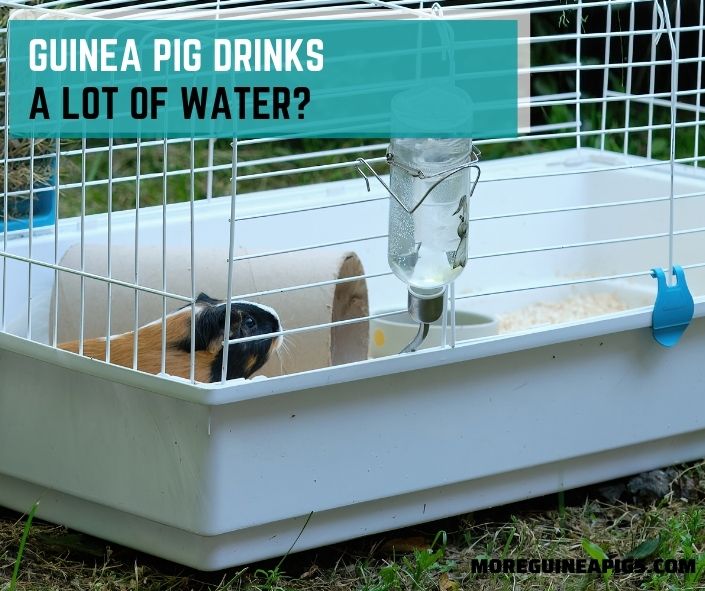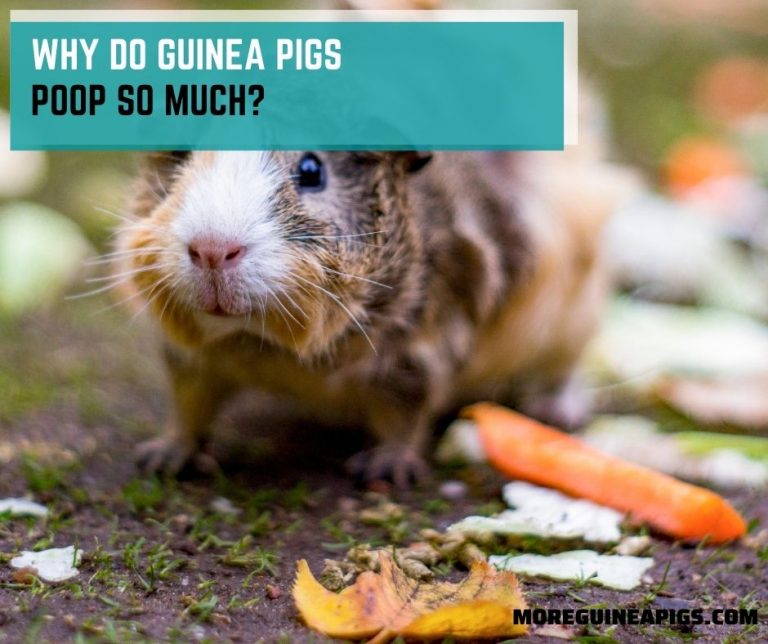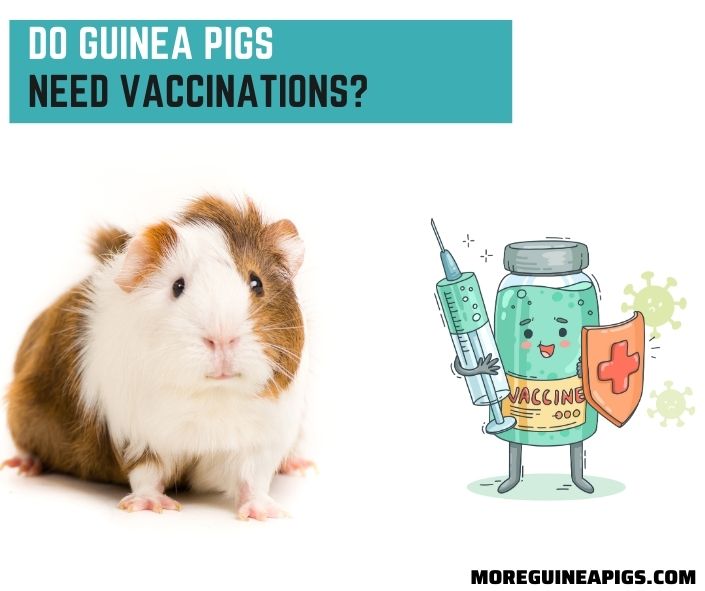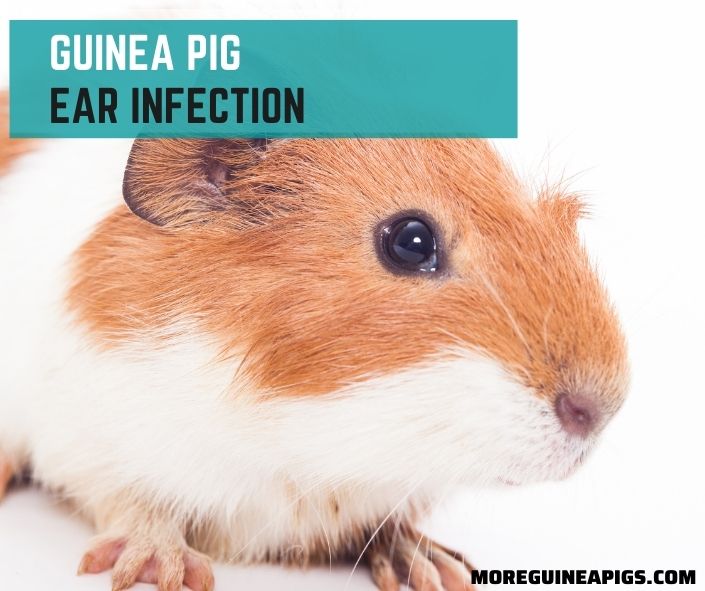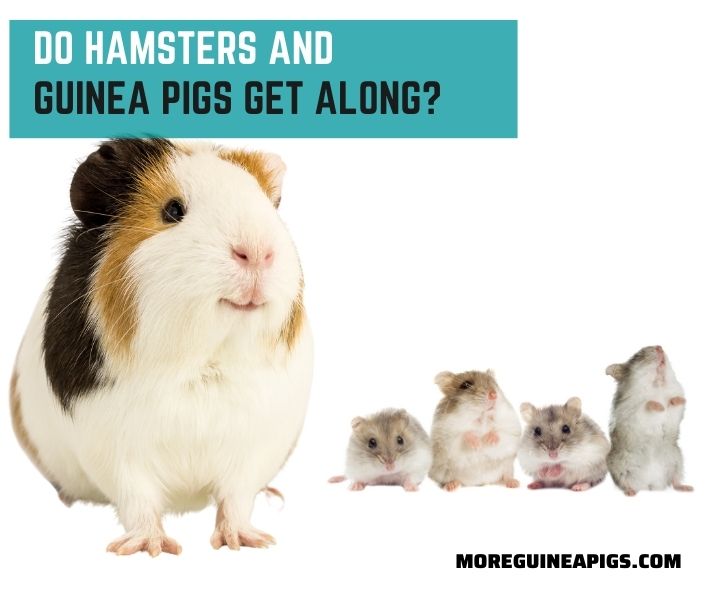How Long Do Guinea Pigs Live?
Lifespan is one of the five key factors people look at before getting a pet. The longer they live, the better. As with humans, most pet lovers mourn bitterly over the death of their pet.
Whether it’s because of old age or illness, losing a pet can be traumatizing, hence, the reason most pet lovers will opt in for a long-lived pet.
For guinea pigs, they have a short lifespan of 7 – 8 years with an average lifespan of 5 – 8 years. Although guinea pigs can live up to 14 years with optimum care, it is very rare.
Therefore, if you’re bothered about losing your guinea pig a few years after you had bonded with it, you should consider the joy and companion it’ll bring you while it is alive.
Guinea pigs are fascinating pets that enjoy the company of their owners. They are sociable, easy to maintain and are ideal for a family with kids.
Moreover, to mention that you can enhance their longevity is something fascinating. Read on to learn how you can enhance your guinea pig’s lifespan.
How Long Do Guinea Pigs Live?
Guinea Pigs are short-lived animals with a wild average lifespan ranging from 1 – 4 years. In captivity, they can live for about 6 – 10 years with optimum care.
Why guinea pigs have a short lifespan especially in the wild is because they are prey animals. For this reason, they hardly grow old without being preyed on by predator animals such as cats, coyotes, wolves, weasels, snakes, hawks, and owls.
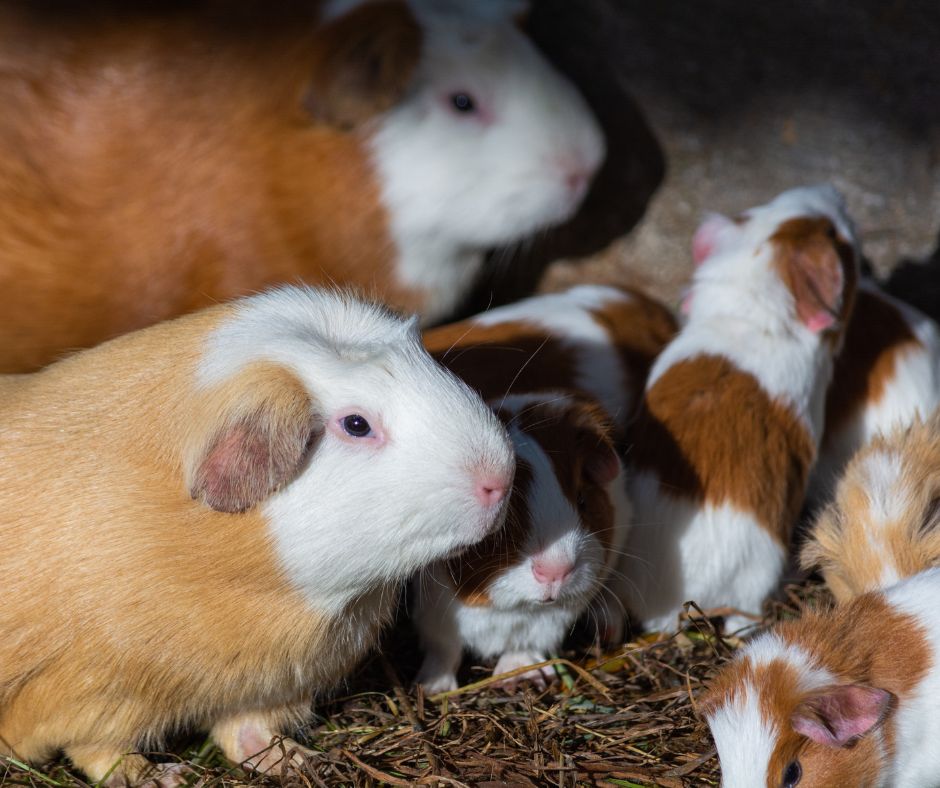
What Affects the Lifespan of Your Guinea Pig?
Many animals have rapid growth within their first 1 – 3 years of life. This applies to guinea pigs too.
Guinea pigs will grow fast and reach adulthood (sexual maturity) around 3 – 4 months of age – such that if a young male and female of this age are housed together, they’re going to breed.
Therefore, an animal who attain sexual maturity this early is likely to have a short lifespan.
The reason isn’t far-fetched. Reproduction (this involves mating, gestation, and giving birth) tends to put so much stress/strain on their body system that they begin to age and deteriorate in health really fast.
Nonetheless, even with a meaningful average lifespan of 5 – 8 years, several factors can shorten it. These factors include poor dieting, genetics, environment, and old age. Let’s look at these factors one after the other:
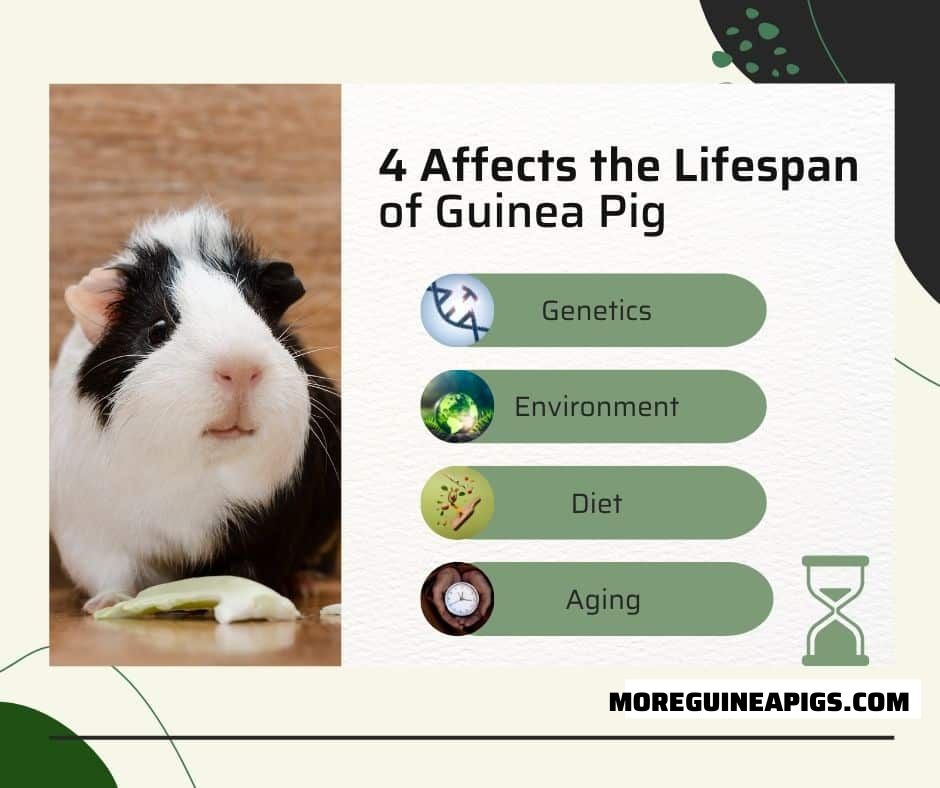
Genetics
As stated earlier, captive breed guinea pigs have an average lifespan of about 5 – 8 years. While some breeds can outlive this range, some will not because of their genetics or breed.
For example, shelties/silkies and the Peruvians have been seen to live up to 12 – 14 years before dying of old age. The hairless breeds of guinea pigs such as the skinny and the Baldwin tend to be short-lived with a lifespan of about 3 – 5 years.
Environment
By environment, this involves where your animal lives, how it’s set up, and how clean it is. A spacious, well-ventilated, well decorated, and clean cage will ensure good health and eliminate stress in your pet’s life.
However, its lifespan will shorten if it’s kept in an unclean, undersized cage. Having to visit the veterinarian so often because of infectious diseases borne out of poor habitation will shorten the lifespan of your guinea pig.
Diet
When investigated, it was found out that the oldest guinea pig who lived for 14 years was maintained on a diet of fresh vegetables, water, regular veterinarian checkups, and lots of exercises. Some of these vegetables include hay, kale, lettuce, etc.
Many of the times, the causes of most chronic ailments such as arthritis, cardiovascular disease, and tumors are diet-related. As a good diet can enhance your animal’s health, a poor diet with little or no nutritional value to your pet can shorten its life as well.
Aging
Like humans, the older a guinea pig gets, the less reproductive and active it becomes. Also, aging guinea pigs tend to exhibit the same characteristics and even ailments as humans.
You’ll notice that as your guinea pig ages, its health starts deteriorating.
Even with optimum care and frequent veterinarian visits, your aged piggie may develop ailments such as arthritis, cataracts, heart disease, stroke, dementia, graying, and even tumor (skin cancer).
Graying mostly appears around the mouth and nose where you notice some gray fur.
Also, old age usually comes with lots of sleeping, less activity, less appetite for food, and in some cases even isolation. These also are signs of any of the ailments mentioned above.
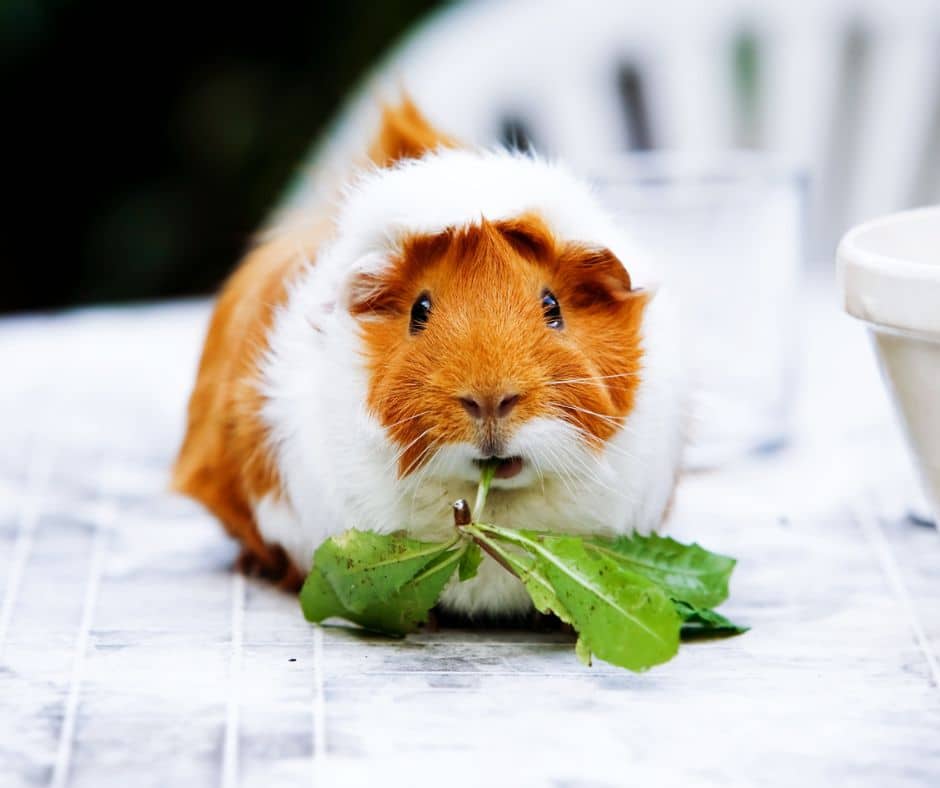
Oldest Guinea Pig
Guinea pigs reach maturity at 3 – 4 months old, and at this age, a pair can start to breed. However, depending on the breed, between the ages of 3 – 8 years, a guinea pig is considered old. The oldest guinea pig ever known lived for 14 years and some months.
What Is the Most Common Cause of Death in Guinea Pigs?
The most common cause of death in pet guinea pigs is pneumonia or inflammation of the lungs. Pneumonia in guinea pigs is a disease that is caused by a bacterial infection called Bordetella bronchiseptica.
However, besides Bordetella bronchiseptica, other bacteria such as Streptococcus zooepidemicus and Streptococcus pneumoniae also cause pneumonia in guinea pigs.
How Can You Increase Guinea Pig Lifespan?
After coming this far in this article, I believe that you understand in clear terms why a guinea pig will live long and what can shorten its lifespan.
If poor dieting, unclean undersized environment, and lack of exercise can affect the lifespan of your pet, optimizing your care and ensuring you eliminate these factors will increase your guinea pig’s lifespan.
In a nutshell, to increase the lifespan of your guinea pig, follow these tips below:
Choose Good Breeds And A Healthy Guinea Pig
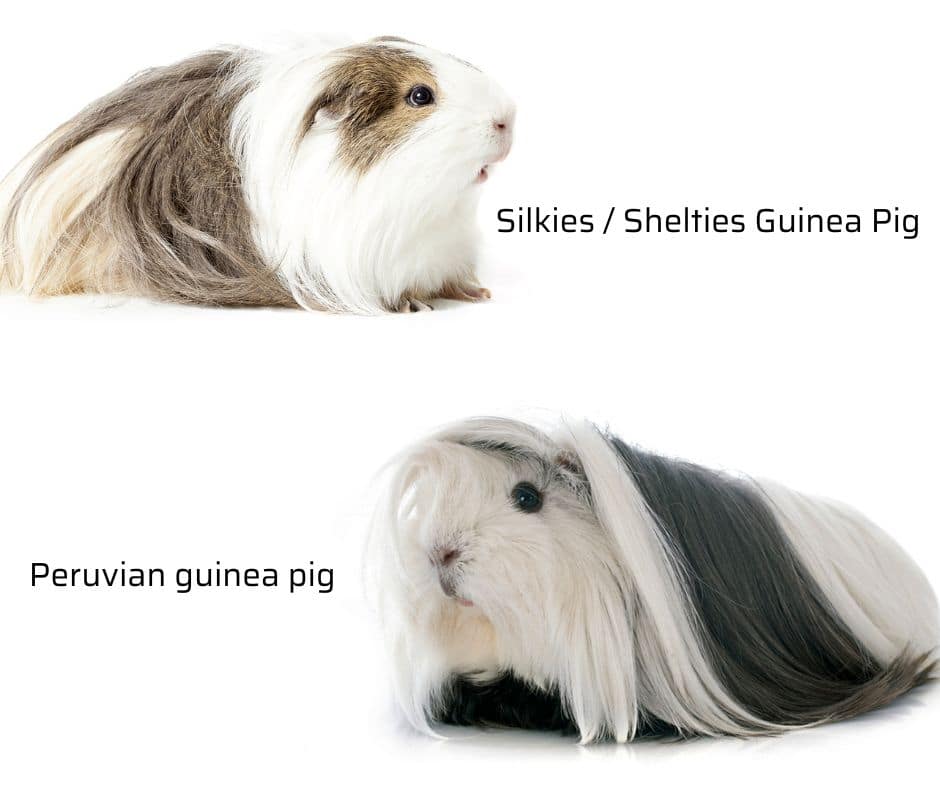
Guinea pigs come in different breeds. Some breeds live long such as the Silkies/Shelties or Peruvians, and there are those with a very short lifespan.
The Silkies/Shelties or Peruvians have the longest lifespan. They can live for 12 to 14 years. The hairless breeds such as the skinny and the Baldwin tend to be short-lived at 3 to 5 years. For starters, you’re advised to choose a healthy guinea pig.
Guinea Pig Age
This is equally important. Besides good health, the age of your pet as of when you got it will determine how long you’ll own it as a pet.
Remember that guinea pigs attain sexual maturity really fast – at 3 – 4 months old. And by 3 – 5 or 8 years in some breeds, they’re already aged.
Thus, if you get your piggie when it’s already 3 years old or even older, that’s already an old or aged piggie that will soon die of old age.
Therefore, when it comes to guinea pigs, it is best you get them when they are still babies or at most 6 months old. This way, you’ll still get to spend some time bonding with your pet before it dies.
Maintain Guinea Pig Cage Comfortability and Cleaning
A clean and comfortable environment equals healthy guinea pigs and vice versa.
These include buying a comfortable standard-sized cage, using the right bedding, ensuring the cage is well ventilated or you use a humidifier in your home, and regularly cleaning the entire cage.
Cleaning your pet’s cage is of two ways. There’s spot cleaning and deep or entire cleaning.
In spot cleaning, you only ensure you clean out leftover foods immediately it’s done and also cleans out fresh poops once it defecates. This will keep the cage bacteria-free and smelling nice.
Also, from time to time, bathe and groom your pet, especially long-haired. This is to keep it clean, smelling nice, and mites/lies free. If your pet is clean, you will reduce the risk of disease.
Guinea Habitat Guinea Pig Cage by Midwest
Keep Your Guinea Pig Healthy and Happy
The best and only way to keep your guinea pig healthy and happy is to give it top-notch care.
By this I mean giving the right diet, engaging in lots of exercises, regular grooming (hair brushing and nail clipping), regular vet visits, paying attention to signs of illness, and timely treatment.
Common diseases such as lung inflammation, skin or eye infection can be timely detected and treated with regular veterinarian checkups.
Guinea pigs are the chattery or vocal type of pets. They like to bond with their owners and also with other pets. Hence, to keep them happy means to have some fun time with them.
You can play with them and cuddle them or best get yours a Guinea Pig Mate to play with. Providing necessary cage accessories to chew and play with is also important. This helps to stimulate their brain and make them alert.
Conclusion
Guinea Pigs are one of the most common and friendly pets, especially in the United States. They are not as skittish and fragile as rabbits or other smaller rodents like gerbils and hamsters.
They are wonderful pets for first-time keepers and kids. They are easy to maintain, bond with and sociable. Guinea pigs are one of the house pets that love to stay in groups.
Hence, if you happen to house only one guinea pig in your home, the animal may not do well because of boredom and loneliness. Nonetheless, with all these great qualities, guinea pigs are short-lived.
This means that they have a short lifespan and will likely die at age 5 to 8 years – because as they are, they tend to develop some health issues. But if you don’t mind their short lifespan, guinea pigs will make you a great indoor pet.
